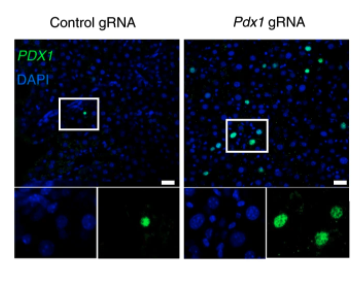New Mice Enable CRISPR-based Epigenome Editing in Living Animals

A CRISPR-Cas9 variant with deactivated DNA-cutting function – known as “dCas9” - is a powerful tool to help researchers understand what genes do when their expression is dialed up or down, but it has some limitations.
The dCas9 protein is big, and the typical adeno-associated virus (AAV) gene delivery vehicles are only able to carry smaller cargo loads. This causes challenges for using dCas9 in living organisms. So, alternatively, researchers often depend on cultured cells to investigate gene function with this tool. But it doesn’t paint a complete picture of the roles of genes in more complex environments.
A group of bioengineers, scientists, and genomicists in the Center for Advanced Genomic Technologies at Duke University have now developed two new transgenic mouse lines for targeted gene regulation using dCas9 in vivo.